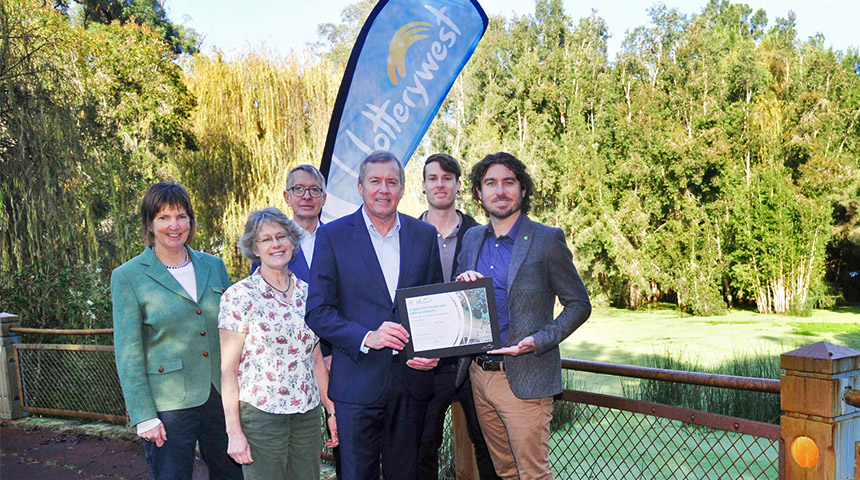
A Lotterywest grant will help conserve declining southwestern snake-necked turtle populations, with Murdoch University’s Harry Butler Institute researchers and citizen scientists to play a major role.
Southwestern snake-necked turtle populations found in wetlands across WA’s south west, are facing dwindling population numbers due to major threats including predators.
Research by Murdoch University’s Anthony Santoro found that across 35 metropolitan wetlands, there were practically no juvenile turtles due to a combination of predation by introduced species, mortality from road strikes, and a lack of suitable nesting habitat.
To help address the urgency to protect the species, Lotterywest has pledged $131,000 to support the roll out of a comprehensive citizen science engagement and education program by local governments and community groups.
The project aims to upskill the community to track turtles and conduct important population and predation tracking surveys, across Perth and regional WA.
Murdoch University’s Dr Jane Chambers, Director of NatureLink Perth, who will oversee the community engagement component of the project, said the money will support delivering better outcomes for the species and preventing further decline.
“We’re ecstatic by this funding which will go towards raising awareness of the turtles and, providing vital training to empower citizen scientists to help conserve this iconic species through monitoring turtles and their habitats,” she said.
Project outcomes will include determining the current distribution of the reptile, implementing necessary management strategies and managing the species’ largest ongoing threats – invasive species, road impacts and changes to water flow.
The South West Group, an alliance of six local governments in the south west metropolitan region, will lead the project, with Murdoch researchers collaborating with a national consortium dedicated to conserve freshwater turtles across Australia.
The project team will also work closely with additional contributors such as Conservation Volunteers Australia, Department of Biodiversity, Conservation and Attractions and local governments across metropolitan suburbs.
The South West Group’s Natural Resource Management (NRM) facilitator, Kathleen Broderick, said the funding is a major step forward in the protection and recovery of the native turtle species.
“The overall goal is to engage our communities and prevent local extinctions of the snake-necked turtle, which would have major ecological impacts,” she said.
"This is another positive step forward to updating the 25-year-old ‘near-threatened’ status.”
Dr Chambers said the team is now looking forward to this opportunity to engage with citizen scientists on a larger scale by expanding the ‘Turtle Tracker’ citizen science program, and training community members in the monitoring of the freshwater species.
“With help from the local community and the City of Cockburn, the Turtle Tracker program has already been tested in Bibra Lake and improved the nesting seasons of 2019, 2020 and 2021,” she said.
“We know it works - and how much the community have already contributed to us reaching important conservation milestones for this species.
“We now look forward to engaging with communities across the wider south west region of WA to conserve these vital and much-loved species. Anyone who’s interested in contributing to crucial research can be involved.”
The one-year project will commence on 1 July, with the community urged to learn how they can get involved by emailing the Saving our Snake-Necked Turtle (SOSNT) project team here.